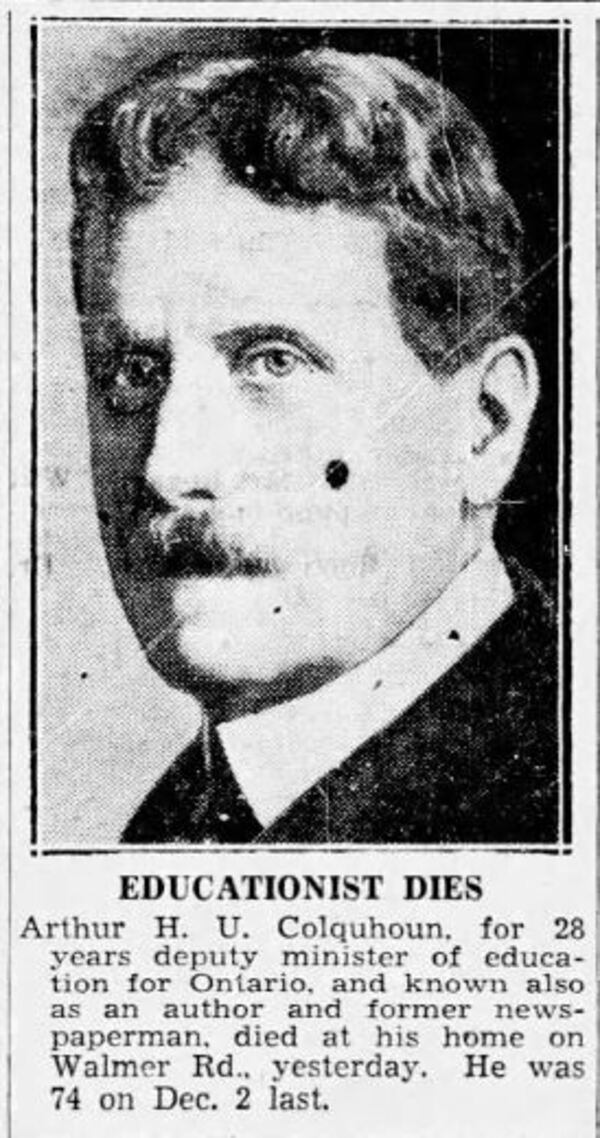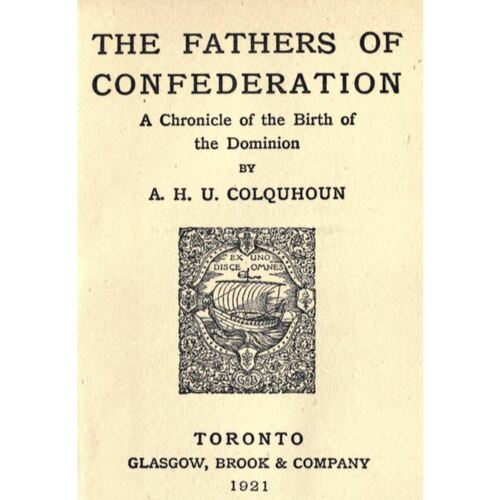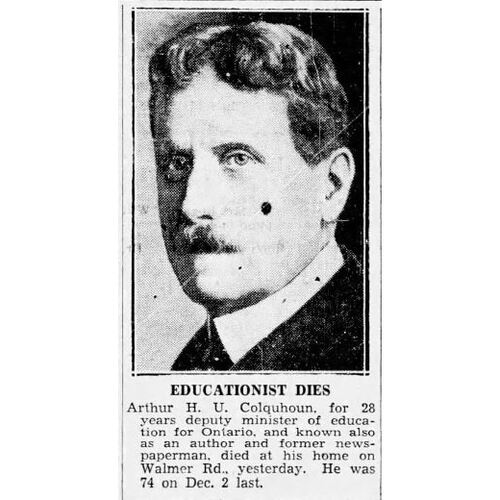
Source: Link
COLQUHOUN, ARTHUR HUGH URQUHART, journalist, editor, author, and civil servant; b. 2 Dec. 1861 in Montreal, son of Walter Colquhoun and Jane Clarke; m. 12 Feb. 1890 Mary Robina Colquhoun (d. 2 Feb. 1894) in Cornwall, Ont.; they had no children; d. 9 Feb. 1936 in Toronto and was buried there in Mount Pleasant Cemetery.
Arthur Huqh Urquhart Colquhoun’s father, originally from Dunbartonshire, Scotland, died shortly before Arthur was born. His mother, Jane Clarke, who was also a native of Scotland, had been the widow of Charles Richardson, a member of Upper Canada’s House of Assembly from 1834 to 1841, with whom she had two daughters. Her second marriage produced at least six more children. Arthur was named for Arthur Wellesley, 1st Duke of Wellington, under whose command one of his ancestors had fought at the battle of Waterloo. The family owned homes in Cornwall, where he attended public school, and Montreal, where he was a student at the High School of Montreal and won the Governor General’s Medal for literature and history. Colquhoun then studied these subjects at McGill College, where he earned a ba (1885) with first-class honours and was awarded the Shakespeare Gold Medal.
Colquhoun entered the profession of journalism while at university, editing the McGill Gazette and, in 1881, joining the staff of Hugh Graham’s Montreal Daily Star. Two years later Colquhoun became editor-in-chief of Graham’s Family Herald and Weekly Star. He was the editor of Philip Dansken Ross*’s Evening Journal (Ottawa) in 1886–87 and then became assistant editor of the Toronto Empire, a Conservative organ that strongly backed the federal government of Sir John A. Macdonald*. Colquhoun was promoted managing editor in 1891 and held that position until 1895. A fellow journalist, Hector Willoughby Charlesworth*, would later recall that during Colquhoun’s Empire days, he was “the most immaculately dressed man in the newspaper fraternity, impeccably neat and a good though ever-courteous disciplinarian.… He was a type of the complete Tory gentleman of the old school, proud as Lucifer of his Highland ancestry, and with a great fund of political acumen under an exterior that in no way suggested the politician.” In 1890 Colquhoun wed Mary Robina Colquhoun, whose family also hailed originally from Dunbartonshire (she and Arthur may have been distant relatives). A long marriage was not to be: Mary contracted tuberculosis and, after an 18-month illness, died on 2 Feb. 1894. Arthur would never remarry.
Between 1895 and 1902 Colquhoun edited two Toronto-based periodicals, the Printer and Publisher and the Canadian Dry Goods Review, and in 1902 he worked for Toronto’s Daily Mail and Empire under Christopher William Bunting*. He then moved to become the news editor at the Evening News (Toronto), which was owned by his friend John Stephen Willison*. In 1903 Colquhoun was a co-winner of an essay contest sponsored by Queen’s College that posed the question: “How can Canadian universities best benefit the profession of journalism, as a means of moulding and elevating public opinion?” His entry, included in a book on the topic, argued that universities were a vital training ground for journalists and concluded that the press was important for the “diffusion of knowledge, as a court of honour and of criticism, as a Parliament of popular discussion,” and “as an independent power.” Five years later he would co-edit the first volume of A history of Canadian journalism …, which contained, along with articles by John Wilson Bengough*, Goldwin Smith*, and others, his 132-page history of the Canadian Press Association, of which he had been president in 1906–7.
The victory of James Pliny Whitney*’s Conservatives in the Ontario election of 25 Jan. 1905 changed the course of Colquhoun’s career, triggering his departure from journalism and his entry into the civil service. His leanings were Conservative, and his acquaintance with Whitney dated from at least 1890, when Colquhoun was working for the Empire and Whitney was an mpp. In his first year as premier, Whitney formed a royal commission to find solutions to the University of Toronto’s financial and administrative problems. Colquhoun, who was chosen as secretary, served on the commission alongside prominent Canadians, including Joseph Wesley Flavelle, Henry John Cody*, Sir William Ralph Meredith*, Goldwin Smith, and Byron Edmund Walker*. Their 1906 report made many recommendations, including the continuance of financial support from the province, the development of closer ties between the university and institutions such as its School of Practical Science and the faculty of medicine, and the granting of greater autonomy to the university, all of which were incorporated into the University Act of that year.
Colquhoun’s performance on the commission, which was recognized with an honorary lld from the university, convinced Whitney to appoint him on 6 Feb. 1906 to succeed John Millar* as deputy minister of the Department of Education, then headed by Robert Allan Pyne. Policy formation and development were handled by Superintendent of Education John Seath*, while Colquhoun was placed in charge of administrative matters. During his 28-year career, the deputy minister, who wrote in 1905 that the purpose of education was not only to teach students reading and writing but also “to produce good citizens,” oversaw important developments, such as the expansion of vocational-school programs and the establishment of schooling for students with intellectual disabilities [see Edith Sarah Lelean]. Most controversial was the 1912 enactment of Regulation 17 [see Francis Walter Merchant; Joseph Octave Reaume], which severely limited the teaching of French, and its 1927 repeal. Described by author John Castell Hopkins* as “a man of fair and reasonable view, without sectarian prejudice,” Colquhoun served the Conservative governments of premiers Whitney, William Howard Hearst* (1914–19), George Howard Ferguson* (1923–30), and George Stewart Henry* (1930–34). He remained at his post when the United Farmers of Ontario, led by Ernest Charles Drury*, held office from 1919 to 1923, and education minister Robert Henry Grant* valued his experience.
When he was not engaged in his duties, Colquhoun, an ardent imperialist, wrote and edited works of history. In 1919 Willison commented, “No man has greater knowledge of the sources of Canadian history, the constitutional evolution of the Empire,” and “the complex influences which make this a hard country to govern.” In The fathers of confederation, the 28th volume in the Chronicles of Canada series published by Robert Pollock Glasgow*, Colquhoun reminds readers that Canada’s place in the British empire has brought it progress and “the blessings of a well-ordered civilization.” Speaking of French Canadians, he adds that their “pride of race, displayed within its own proper bounds, makes for the strength and not the weakness of the Dominion.”
Arthur Hugh Urquhart Colquhoun finally left his post as deputy minister in July 1934, shortly after the election of Mitchell Frederick Hepburn*’s Liberals. He continued to write, publishing a biography of Willison, but his retirement years were cut short by prostate cancer. He died on 9 Feb. 1936 in Toronto’s Wellesley Hospital. In a perceptive 1921 biographical sketch, the Winnipeg Tribune had judged Colquhoun to be a “highly informed man, broad in his outlook, tolerant of other races and creeds,” and “a democrat of the democrats in practice.” His commitment to purposeful journalism and his belief in the utility of higher education had shaped his career, which began with commenting on government and ended with working on its behalf.
Arthur Hugh Urquhart Colquhoun’s writings can be found in many of the newspapers and journals of his era. The following list includes some of his most important publications: “The man who made the Montreal Star: Hugh Graham, esq.,” Printer and Publisher (Toronto), 4 (1895), no.4: 6–7; “Canadian universities and the press,” in “How can Canadian universities best benefit the profession of journalism, as a means of moulding and elevating public opinion?”: a collection of essays, ed. editors of Queen’s Quarterly (Toronto, 1903), 11–33; the biographical sketch of William Dunlop for the latter’s Recollections of the American war, 1812–14 … (Toronto, 1905); “Goldwin Smith in Canada,” Canadian Magazine, 35 (May–October 1910): 315–23; The fathers of confederation: a chronicle of the birth of the dominion, 1916, as volume 28 of Chronicles of Canada, ed. G. M. Wrong and H. H. Langton (32v., Toronto, [1914–16]); “The first Lord Lansdowne,” Canadian Magazine, 52 (November 1918–April 1919): 527–31; “Sir John A. – after thirty years,” Canadian Magazine, 57 (May–October 1921): 93–97; the introduction and biographical sketch of the author for John Richardson, Tecumseh and Richardson: the story of a trip to Walpole Island and Port Sarnia (Toronto, 1924); “The journalistic field of 1887: memoirs of the background from which Saturday Night sprang,” Saturday Night, 10 Dec. 1927: 2–5; and Press, politics and people: the life and letters of Sir John Willison, journalist and correspondent of the “Times” (Toronto, 1935). Colquhoun edited J. R. Gowan’s A memoir (Toronto, 1894) and co-edited the first volume of A history of Canadian journalism … (2v., Toronto, 1908–59).
A longer list of Colquhoun’s works, though not an exhaustive one, is held in the DCB office.
AO, F 5-1 (Corr. of Sir James Whitney). Globe, 10 Feb. 1936. Toronto Daily Star, 10 Feb. 1936. Winnipeg Tribune, 28 Oct. 1921. H. [W.] Charlesworth, Candid chronicles: leaves from the note book of a Canadian journalist (Toronto, 1925). J. C. Hopkins, Canadian annual review: war series (4v., Toronto, 1918), 1 (1914). Ont., Royal commission on the University of Toronto, Report (Toronto, 1906). W. S. Wallace, “Arthur Hugh Urquhart Colquhoun,” CHR, 17 (1936): 89–90.
Cite This Article
Geoff Keelan, “COLQUHOUN, ARTHUR HUGH URQUHART,” in Dictionary of Canadian Biography, vol. 16, University of Toronto/Université Laval, 2003–, accessed April 18, 2025, https://www.biographi.ca/en/bio/colquhoun_arthur_hugh_urquhart_16E.html.
The citation above shows the format for footnotes and endnotes according to the Chicago manual of style (16th edition). Information to be used in other citation formats:
| Permalink: | https://www.biographi.ca/en/bio/colquhoun_arthur_hugh_urquhart_16E.html |
| Author of Article: | Geoff Keelan |
| Title of Article: | COLQUHOUN, ARTHUR HUGH URQUHART |
| Publication Name: | Dictionary of Canadian Biography, vol. 16 |
| Publisher: | University of Toronto/Université Laval |
| Year of revision: | 2024 |
| Access Date: | April 18, 2025 |




